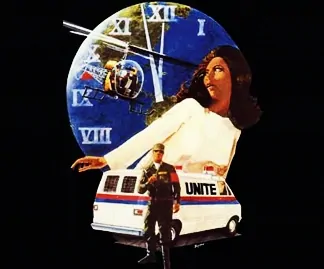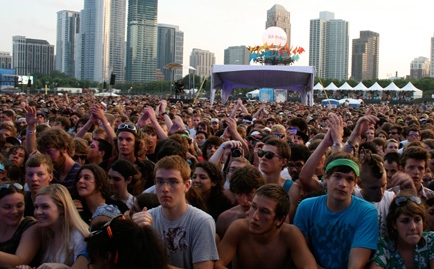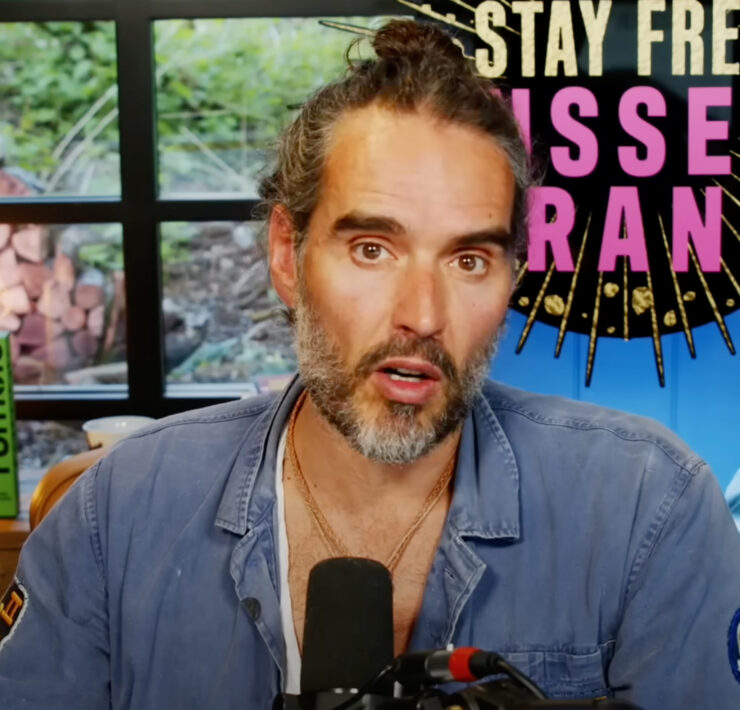
Two End Times authors talk writing, satire and the danger of imminent rapture.
I first met Rob Stennett in the spring of 2008. He had just released his debut novel, The Almost True Story of Ryan Fisher (Zondervan), a brilliantly satirical romp in which a non-theistic real estate agent ends up the pastor of a megachurch. Rob emailed me to mention that he was already at work on his second novel—it was about the End Times—and he was enjoying my Pocket Guide to the Apocalypse as part of his research.
I liked him already. I still do. Even more so now that his end-times novel has released. Called The End Is Now [here’s our review], it tells the story of the Henderson family and what happens when their small town becomes the test market for the rapture—the spiritual event in which some Christians believe they will be taken up to heaven prior to Christ’s second coming.
(Disclaimer: I endorsed The End Is Now, because Rob is a friend and because the book is excellent. My exact words were: “If any genre needs a good satirist, it’s end-of-the-world fiction. Good thing we have Rob Stennett. He’s the Christopher Buckley of rapture reading.”)
Anyway, as mutual fans of the apocalypse, Rob and I caught up to discuss the state of rapture fiction, growing up during the (alleged) last days and what it’s like to be a satirical Christian novelist.
Boyett: Where did the idea for The End Is Now come from?
Stennett: I wanted to write a murder mystery. So I wrote about this small ski town where these murders were happening. I even had this great scene where the lift operator turns on the lift one morning and a dead body comes down. It was like the beginning of a CSI episode. But as I writer, I had to ask myself why these murders were happening. I thought, Well, what if someone is trying to convince everyone the rapture was coming?
Then it hit me: What if the whole town thought the rapture was coming? That seemed like such a good idea that I went home and changed the whole story. I moved the rapture from a small ski town to Kansas (weather was going to be a part of this story). But let me say this: I never thought I’d write a rapture book. And this isn’t your typical rapture book by any stretch. I wanted it to feel more like Close Encounters of the Third Kind meets a Stephen King story, with a bit of a satirical bite thrown in.
My personal interest in the apocalyptic stuff came from being exposed, as a kid, to a lot of the typical Left Behind-type eschatology. I’m guessing you grew up the same way. How exposed were you to that kind of theology?
Very exposed. As a kid, I wasn’t allowed to watch Ghostbusters or Gremlins so my friends and I all got together and watched [the classic 1970s rapture movie] A Thief in the Night. After it was over, I remember being really freaked out about being whisked away to heaven. I started reading Revelation all the time. My dad was a minister, and once I walked into the middle of this Bible study he was having and told them that the end was coming at July 11, 1987. That’s the day after my birthday.
Wait a second. You came to your dad’s Bible study group and predicted the date of the rapture? You’re going to have explain that one.
OK, maybe I didn’t elaborate enough. This was back in 1985, when everyone was convinced we would have to get barcodes tattooed on our arms and this would be the Mark of the Beast. (I’m really sad this never happened because I lose my wallet all the time and this would have been such an easier way to keep track of my driver’s license and credit cards.) Anyway, I sat in the hallway upstairs, out of eyesight but within earshot of the group, and I soaked everything in. And the way they were talking … I felt like they were right. We really were in the End Times: the Cold War, the Reagan Presidency, the immorality that was in every non-“Cosby Show” sitcom.
So, I started trying to figure out when the end of the world would happen. Two years away seemed right—it’s a lifetime when you’re eight—and July seemed like a time when everyone would least expect it (why would God ruin a perfectly good summer?) Deep down I wanted it to be after my birthday. So I predicted July 11, 1987.
They all laughed at me. They thought it was cute that I was trying to predict the end of the world. Here I am, all doom and gloom, and they’re treating me like this is an episode of Kids Say the Darnedest Things. So, yeah, I was a crazy kid. And yes, this episode inspired much of where Will Henderson [the protagonist of The End Is Now] came from.
Wow.
Yeah.
The End Is Now has been accurately described as a satirical novel, and satirical novelists like Christopher Buckley or Christopher Moore typically have a specific target in mind. Did you go into this thinking, "This is what I want to say about end-times hysteria"? Or did it develop organically as the story came together?
I don’t know if I was trying to make one point as much as explore a big idea. Lots of movies have been made (and books have been written) about the end of the world. But very few have explored why we are so fascinated with this idea. Why does every generation on Earth think they are witnesses to the end of the world? And what does it mean when a family doesn’t see eye-to-eye on this? Even more, what does it mean for half of a family to think they’re going to heaven while the other half is going to hell? I always knew this was the point I wanted to write about, but it came together better than I could have imagined.
Let’s discuss technique, because plotting is the writerly road bump that has really kept me from pursuing fiction. Do you outline the entire plot before writing? Or are you a seat-of-the-pants plotter?
Seat of the pants. I love scenes. I think about them all the time. But thinking about a whole story feels boring and intimidating. So I had a basic trajectory [in mind] and started writing. The story turned out very differently than I thought it would. But people have contacted me and told me how much they loved the ending. And I was really freaked out about it because, when you’re writing about the end of the world, how you end your story is a big deal. I had a bunch of different endings in mind, but the one I wrote was the one I felt like I could live with myself knowing that I had written it.
Personally, I loved the ending, too. But I’m thinking it would be spoilerish to discuss it in any detail, so let’s move on. What kind of feedback have you gotten about the storyline? A lot of the Left Behind, dispensationalist types are very serious about this stuff.
Very serious is right. Some people have gotten upset. I guess they feel like I’m making fun of the rapture. I’m not—or at least that wasn’t the intention. If anything, I’m trying to get a group of readers/people to explore eschatology who never would have touched the subject before. So, usually people who get upset with it are people who haven’t read it. Some groups have an amazing ability to boycott things they’ve never read. Most who have read it found an insightful story about faith, marriage, family and the mark of the beast. Or at the very least, the first three of those things.
I totally should have used that “marriage, family and the mark of the beast” line for my endorsement. Can I ask about your “real job”?
Sure.
You’re the Creative Director at New Life Church in Colorado Springs, which has been, um, pretty visible over the last few years. How much does public perception of you or your employer impact your writing? Does it at all?
I lost three months of sleep over this with my first novel (The Almost True Story Of Ryan Fisher) because in the middle of writing it, Ted Haggard, my senior pastor and friend—he even officiated my wedding—had a story break that made it into national headlines. I thought, Can I still write this? And I came to the conclusion that my circumstances had changed, but my thoughts and beliefs hadn’t. In fact I thought that now more than ever the basic themes in the story are still the same: If we put all our trust in people, if we expect them to be God for us, then they will always disappoint us in some way.
That said, I’m always hopeful that people know that my novels are about questions from me, not from New Life Church. But maybe I need a disclaimer like the director’s commentary on a DVD. Something that says these questions don’t represent every person that is a part of my church, they are just springing out of this thirty-something author who is trying to write funny, soul-searching novels.
What was the research like for The End Is Now? Please tell me you read the entire Left Behind series, watched the movie and spent days interviewing Tim LaHaye.
I read much of the Left Behind series. I watched the movie and every rapture movie I could get my hands on. I went to Born Again Books and found a bunch of prophecy books on the end of the ages. I read The Late Great Planet Earth (Hal Lindsey’s 1970s pro-rapture book) and The Spirit of Prophecy (Max King’s 1970s anti-rapture book). I read 1950s novels about the world ending in a nuclear holocaust. I watched War Games (the best movie not named The Breakfast Club Ally Sheedy has ever starred in).
And truthfully, one of the best books I found on the subject was your book, Pocket Guide to the Apocalypse. I don’t think I’ve even told you this, but there’s this chapter in the book where I chronicle all of the false rapture predictions in the history of Goodland, Kansas, where the novel is set. It’s the first chapter titled “Goodland, Kansas,” and the Pocket Guide very much inspired that.
I am highly pleased to have played a minor role in your research. But not so minor that I won’t take some credit for it when The End is Now becomes a runaway bestseller.
When it hits The New York Times list, you can say The End Is Now is the novelization of the Pocket Guide.
I will do exactly that. Let’s talk theology. What position do you take regarding the End Times? Is there a eschatological framework—like the pre-millennialism of Left Behind, for instance—that seems right to you?
The more research I did, the more torn I was about the subject. The more I thought: This isn’t going to play out anything like we think it will. I’m really not sure if one day all the Christians will just vanish in piles of clothes and unmanned vehicles, because over the 2,000 years there have been so many different ways we imagined the end of the world coming. And I’m pretty positive it’s not going to happen in my lifetime, but now that I’ve said that I’ll probably be raptured right in the middle of answering this question (or you’ll be raptured right in the middle of the answer).
I’m still here, so let’s assume the rapture didn’t happen. I’m right there with you when it comes to “the more I’ve studied it, the less I know.” In fact, when people ask me what I believe about the End Times, I tell them I’m an “eschatological agnostic,” which means I have no idea how it’ll play out and I don’t have any interest in any kinds of predictions. I am interested, however, in the relationship between knowledge and uncertainty. The more I seem to learn about a subject—the apocalypse, the Bible, the afterlife—the less certain I become about it. As a Christian writer and researcher, can you identify with that? If so, what do you make of it?
Yeah, I can definitely identify with uncertainty. There are stories in the Bible that I once thought were really nice (Abraham and Isaac, for instance), until with study and critical reading of them they just became frightening. It made me wonder: How did I ever find solace in a story like that? And just as troubling is that I’ve researched the rapture and learned where these ideas were formed. I’ll realize: OK, so a minister (or a group of ministers) took this combination of verses and came up with a theology from it. Then other people wrote about it. Then someone made a movie about it and wrote a catchy song and a book about it all from this teaching. But still, there are verses in the Bible that describe these things. So are they right or are they wrong? Or is it even that simple?
So if all the research and writing has taught me anything, it’s that we have to engage in what we believe in. Not just regurgitate something. This is one of the reasons we need stories. Jesus used them all the time. Stories help us to explore our beliefs and what they mean. They also let us come up with our own conclusions … whereas sermons can often prepackage solutions for you.
I’m not trying to sound like everything is relative, but I am saying these are issues that have been debated for thousands of years, and the arguments on both sides of the coin are really strong. Everything I write has a tone of uncertainty in it because I think these subjects are too complex to just say, “Well I’ve got it all figured out.” I’ll step off my soapbox now.
Then I’ll give you another soapbox to stand on. It seems like most of the big, successful Christian novels are either romances, thrillers, or have the names Tim LaHaye and Jerry B. Jenkins on the cover. Your books don’t fit within these categories. Is it hard to sell satirical, funny Christian fiction?
Yes, for the most part, that is the Christian novel market. But, remember, at one time there were only very basic sermon-oriented books instead of guys like Rob Bell and Donald Miller stretching what a Christian book could be. So, I guess, in my own way, that’s what I’m trying to do.
There are lots of great Christian romances and thrillers. But for people who like Christopher Buckley and Christopher Moore I’m trying to write in that vein. And it wasn’t easy to get my foot in the door. But it just takes a publisher to believe in you. I had an editor named Andy Meisenheimer at Zondervan who was willing to roll the dice. Now, I have to hope people are willing to take the same chance on me.
People are suspicious of you when you write satire and you’re a person of faith. So, I guess, if that’s you and you’re reading this right now, all I can ask as you take the Pepsi challenge and give Rob Stennett a shot.
What’s next for you, writing-wise?
Demons. I’ve written about megachurches (Ryan Fisher) and the rapture, so I want to write a satirical thriller (is that even a genre?) about demons in my third novel. The working title is Fallen World. It’ll come out from Zondervan sometime in 2010.
And then I have this novel ratting around in the back of my head and it’s about sex and abstinence and Christianity and I want to call it Pure. Don’t know when or if that will ever be published. I’m still not sure what’s riskier to write about: a) the rapture, b) demons or c) sex. If this were a multiple choice, I’d have to say d) all of the above.
I’d agree with you, but I’m pretty sure Janette Oke covered connubial End Times demons in the Love Comes Softly series.
(Silence.)
Rob? Rob, you there? Please tell me you didn’t just get raptured. Rob?
Read more about Rob Stennett and The End is Now at EndIsNow.com.
Jason Boyett is the author of the Pocket Guide series of books, including Pocket Guide to the Afterlife, Pocket Guide to Sainthood, and Pocket Guide to the Bible (see PocketGuideSite.com). Jason blogs about faith and culture at JasonBoyett.com.





















